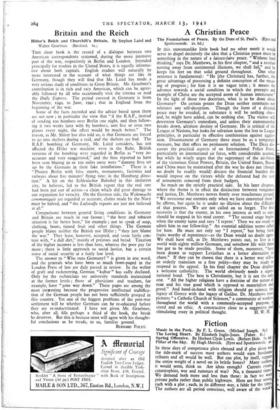A Christian Peace
IF this statesmanlike little book had fro other merit it would serve to dispel decisively the idea that a Christian peace must be
something in the nature of a laissez-faire peace. "Without hard thinking," says Dr. Matthews, in his first chapter, " and a resolute
turning away from sentimental illusions, we shall fail," and he keeps his feet on- that solid ground throughout. One other sentence is fundamental: "He [the Christian] has, further, the
great advantage of possessing a definite conception of the mean- ing of progress ; for him it is no vague term ; it means the
advance towards a social condition in which the precepts and example of Christ are the accepted norm of human intercourse," In the light of those two doctrines, what is to be done about Germany? On certain points the Dean neither entertains nor
tolerates any self-deception. Though the form of a dictated peace may be avoided, in substance it will be nothing else— and, he might have added, can be nothing else. The victors will
determine Germany's immediate, and unless their statesmanship breaks down, ultimate destiny of Germany. He is critical of the League of Nations, but looks for salvation none the less to League principles, in particular to effective combination against aggres- sion. Disarmament of Germany there must be as a temporary measure, but that offers no permanent solution. The Dean dis- cusses the practical aspects of an International Police Force, particularly an international air force, with considerable acumen, but while he wisely urges that the supremacy of the air-forces of the victorious Great Powers, Britain, the United States, Russia and China must be maintained after the war he does not (though no doubt he readily would) discuss the financial burden this would impose on the victors while the defeated had the cost of armaments removed from their budgets.
So much on the strictly practical side. In his later chapters, where the theme is in effect the distinction between vengeance and justice, Dr. Matthews moves firmly over treacherous ground.
" We overcome our enemies only when we have converted them," he affirms, but again he is under no illusion about the difficulty of that process. We are not called on to forget. The first necessity is that the enemy, in his own interest as well as ours, should be stopped in his mad career. " The second stage begins
when the enemy turns and says ' I repent.' Then we are ready to admit him to our fellowship." An essential addition seems called for- here. He must not only say " I repent," but bring forth fruits worthy of repentance—as the Dean would no doubt agree. We shall have still, as Dr. Matthews points out, to live in a world with eighty million Germans, and somehow life with them has got to be made possible. Some of them, moreover, "have been drawn to support Leviathan as a better alternative to chaos." If they can be shown that there is a better way still— an orderly transition to a free polity—they may be ready to respond to the appeal. In his final chapter the Dean displays a welcome catholicity. The world obviously needs a super- national bond. The best is Christianity, but it is not the only one. " All the higher religions have a doctrine of the nature of man and his true good which is opposed to materialism and greed." And hand-in-hand with religion should go science, the legacy of Greece with the legacy of Galilee. Dr. Matthews even pictures " a Catholic Church of Sciences," a community of workers throughout the world with a commonly-accepted purpose, a creed and an -ethic. A constructive close to a suggestive and
stimulating essay in political thought. H. W. IL


























 Previous page
Previous page